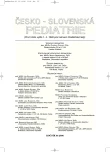-
Medical journals
- Career
TNF G-308A Polymorphism in Children with Nephrotic Syndrome
Authors: L. Kovács; Ľ. Podracká; M. Hladík; P. Geier
Authors‘ workplace: Detská klinika LF UP a FN, Olomouc prednosta prof. MUDr. V. Mihál, CSc. ; 1. detská klinika LF UJPŠ a DFN, Košice prednostka prof. MUDr. Ľ. Podracká, CSc. ; Oddelenie pediatrickej anestéziológie a intenzívnej starostlivosti FNsP, Ostrava primár MUDr. M. Hladík ; 2. Detská klinika LFUK a DFNsP, Bratislava prednosta prof. MUDr. L. Kovács, DrSc., MPH
Published in: Čes-slov Pediat 2006; 61 (4): 186-189.
Category: Original Papers
Overview
Pathogenesis of nephrotic syndrome (NS) in children is still unknown, recent data suggest involvement of T cell dysfunction with altered cytokine production. Several papers revealed increased production of TNF during the acute phase of NS as well as its relationship to the severity of the disease. The recent study paper was designed to characterize the association of single nucleotide polymorphism of the TNF gene in position -308 (TNF G-308A) with the natural course of NS in children. DNA samples were collected from 102 children (64 boys and 38 girls with NS aged 3–15 years (median 7 years) – 78 of them had NS sensitive to steroids (SSNS), while in the rest of the cases were resistant to steroid treatment (SRNS). There were no significant differences between the groups of children with SSNS and SRNS as to their sex, age and age at disease onset respectively. Prevalence of allele TNF -308A in the whole group of children with NS did not differ significantly from that in the control group (26.4% vs. 22.0%, n.s.). However, prevalence of allele TNF -308A was significantly higher in children with SRNS as compared to patients with SSNS (12/24, 50.0% vs. 15/78, 19.2%, OR: 4.2, ČI: 1.64–11.17, p <0.01) and the control group respectively. Our data, thus reveled an increased risk of developing SRNS in carriers of the TNF -308A allele and thus support previous data on the role of TNF in the course of childhood nephrotic syndrome. However, another prospective study of more patients should be performed to validate these results and their value to predict the pathological type of NS and the response of patients to steroid therapy.
Key words:
TNF, polymorphism, nephrotic syndrome
Labels
Neonatology Paediatrics General practitioner for children and adolescents
Article was published inCzech-Slovak Pediatrics

2006 Issue 4-
All articles in this issue
- Low-dose Technique of Spiral CT of the Lungs in the Diagnostics of Metastatic Focal Findings in Children and Adolescents
- TNF G-308A Polymorphism in Children with Nephrotic Syndrome
- Methylmalonic Acidemia: Clinical, Biochemical and Molecular Biological Study
- Progressive Familial Intrahepatic Cholestasis – Manifestations and Diagnosis in Infancy
- Heiner Syndrome (Pulmonary Hemosiderosis Induced by Allergy to Cow’s Milk Proteins)
- Immune System in Patients with Cystic Fibrosis. Is Everything Normal?
- Czech-Slovak Pediatrics
- Journal archive
- Current issue
- Online only
- About the journal
Most read in this issue- Methylmalonic Acidemia: Clinical, Biochemical and Molecular Biological Study
- Heiner Syndrome (Pulmonary Hemosiderosis Induced by Allergy to Cow’s Milk Proteins)
- Low-dose Technique of Spiral CT of the Lungs in the Diagnostics of Metastatic Focal Findings in Children and Adolescents
- Progressive Familial Intrahepatic Cholestasis – Manifestations and Diagnosis in Infancy
Login#ADS_BOTTOM_SCRIPTS#Forgotten passwordEnter the email address that you registered with. We will send you instructions on how to set a new password.
- Career

